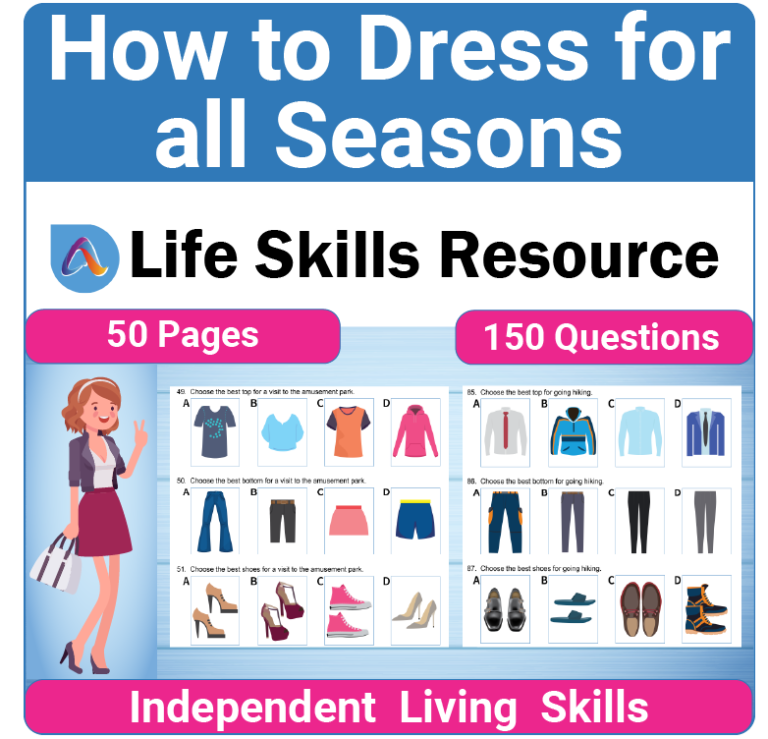Develop Independent Living Skills for Individuals with Autism
Developing independent living skills for young adults is a goal for every parent, especially as they transition into adulthood. With age, developing independent living skills is vital to achieve a wholesome life. Individuals with special needs also look forward to living as independently as possible. Learning and practicing interactive life skill activities is essential for this journey. Our life skill resources and life skill videos can help you get going.
Living With Autism
For parents, having a child who is on the autistic spectrum is a challenging affair. A personalized support plan is necessary to cater to the unique needs of each individual with autism. Compared to other neurotypical individuals, autistic individuals can face several challenges, making their day-to-day lives stressful and confusing.
Understanding Personal Motivations
Each individual is unique in their motivations and goals. Before helping children or young adults with autism develop independent living skills, it is essential to understand a few things.
These involve:
- Understanding their primary needs
- Recognizing and prioritizing their interests
- Understanding their abilities and capabilities
- Identifying individual preferences, values, and beliefs
These will help them be better prepared for independent living in their present and future situations. A highly functional individual can engage in self-reflection and be aware of their needs, abilities, and preferences, which allows them to make decisions based on their individuality. If your child needs to improve in any of these areas, consider spending regular focused time with them before they transition into adulthood and develop independent living skills. Their caregivers can assist, or you can collaborate with a specialized group or therapist to develop the necessary skills. Enrolling your child in community organizations and recreational activities can help you achieve this goal.
Early Challenges Faced by Individuals with Autism
Interacting with people can be challenging for autistic individuals due to social deficits and difficulty communicating verbally. Social skills are crucial for developing meaningful relationships, succeeding in social situations, and achieving independence. Therefore, it is essential to consistently work on developing social skills. Despite the challenges, autistic individuals can learn skills to live independently.
Adopting Independent Living Skills Resources
It is crucial to tailor the approach based on the individual’s position on the autism spectrum. Developing independent living skills can be facilitated through a personalized system. At Adulting on the Spectrum, we support autistic individuals on their journey toward greater independence at school, the community, and home. Our collection of online resources includes independent living skills resources and interactive life skills activities.
These resources help to develop core living skills, which include:
- Self-awareness skills (adapting to new environments, personal safety and security)
- Money management and budgeting (learning to calculate sales tax and discounts, preparing a budget for buying groceries and clothes, learning how credit cards work) through money math activities
- Self-help skills (hygiene-related concerns, creating a shopping list)
- Communication skills (how to converse, apply and prepare for a job interview, learn social etiquette, communicate with friends, schedule an appointment)
- Problem-solving skills (finding healthcare services, requesting assistance at work, asking for help)
- Employment skills (work ethic, soft skills, managing behavior on the job)
Developing independent living skills can empower autistic individuals to achieve financial independence and confidently overcome daily challenges. Developing independent living skills can help individuals identify their strengths, weaknesses, and possible career paths. They can learn to live independently and build a social circle. These skills have the potential to create fresh opportunities. Developing essential life skills, such as money management, self-care, cooking, and meal planning, is crucial for autistic individuals to achieve independent living.
Embracing Interactive Life Skills Activities
With tailor-made resources, our activities are designed to be accessible to everyone, ensuring everyone can benefit. Our user-friendly resources offer the following benefits.
Interactive Learning
Our activities are more than just lessons; they are interactive experiences that encourage active participation. This engagement promotes understanding and practical application of essential life skills.
Real-World Experience
We recognize the importance of real-world application. Our activities contain practical scenarios, including safety, time management, and personal organization. These scenarios bridge the gap between theory and daily life.
Age-Appropriate Graphics
Visual aids are crucial for comprehension and retention. Our activities feature age-appropriate graphics that enhance learning and make the experience enjoyable.
What Does Independent Living Look Like for Adults with Autism?
Each autistic individual can increase their level of independence with a personalized approach and robust support system. Learning new skills through online resources is an effective way to boost motivation and confidence. It is essential to set clear goals and establish a plan which enables individuals to measure their progress over time.






